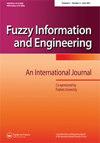Effective Approach to Construct Series Solutions for Uncertain Fractional Differential Equations
IF 1.3
Q2 MATHEMATICS, APPLIED
引用次数: 1
Abstract
Purpose: We construct the analytical approximate resiual power fuzzy series solutions of fuzzy conformable fractional differential equations in an -level depiction in the sense of strongly generalized -fuzzy conformable derivative in which of the all initial conditions are taken to be fuzzy numbers. Methodology: The certain fuzzy conformable fractional differential equation under strongly generalized -fuzzy derivative is converted to a crisp one as a family of differential inclusions and solved via resiual power method. The main drawback concerning the use of differential inclusions is that it does not contain a fuzzification of the differential operator; instead, the solution is not essentially a fuzzy valued function. Findings: (i) To show the efficiency of our proposed method: Several important and attractive test examples, which included the fractional conformable fuzzy integro-differential equation are discussed and solved in detail. (ii) To show the stability of approximate solutions to specific problems: some graphical results, numerical comparisons and tabulate data are created and discussed at different values of Value: Using the residual power series analysis methos is a powerful and easy-to-use analytic tool to solve initial problems on fuzzy conformable fractional differential equations and it successfully applied to solve real life problems such as the inductance–resistance–capacitance, RLC-series circuit.构造不确定分数阶微分方程级数解的有效方法
目的:在强广义-模糊可合导数意义下,构造模糊可合分数阶微分方程的解析近似残幂模糊级数解,其中所有初始条件均取模糊数。方法:将某一类强广义-模糊导数下的模糊适形分数阶微分方程转化为一个清晰的微分包含族,用余幂法求解。关于使用微分包含的主要缺点是它不包含微分算子的模糊化;相反,解决方案本质上不是一个模糊值函数。结果:(1)为了证明所提方法的有效性,讨论并详细地求解了几个重要的、有吸引力的测试实例,其中包括分数形符合模糊积分-微分方程。(ii)为了显示具体问题近似解的稳定性:在不同值的情况下,创建了一些图形结果、数值比较和表格数据,并进行了讨论。利用剩余幂级数分析法是解决模糊符合分数阶微分方程初始问题的一种功能强大且易于使用的分析工具,并成功地应用于解决实际生活中的电感-电阻-电容、rlc -串联电路等问题。
本文章由计算机程序翻译,如有差异,请以英文原文为准。
求助全文
约1分钟内获得全文
求助全文
来源期刊

Fuzzy Information and Engineering
Mathematics-Logic
CiteScore
2.30
自引率
0.00%
发文量
13
审稿时长
40 weeks
期刊介绍:
Fuzzy Information and Engineering—An International Journal wants to provide a unified communication platform for researchers in a wide area of topics from pure and applied mathematics, computer science, engineering, and other related fields. While also accepting fundamental work, the journal focuses on applications. Research papers, short communications, and reviews are welcome. Technical topics within the scope include: (1) Fuzzy Information a. Fuzzy information theory and information systems b. Fuzzy clustering and classification c. Fuzzy information processing d. Hardware and software co-design e. Fuzzy computer f. Fuzzy database and data mining g. Fuzzy image processing and pattern recognition h. Fuzzy information granulation i. Knowledge acquisition and representation in fuzzy information (2) Fuzzy Sets and Systems a. Fuzzy sets b. Fuzzy analysis c. Fuzzy topology and fuzzy mapping d. Fuzzy equation e. Fuzzy programming and optimal f. Fuzzy probability and statistic g. Fuzzy logic and algebra h. General systems i. Fuzzy socioeconomic system j. Fuzzy decision support system k. Fuzzy expert system (3) Soft Computing a. Soft computing theory and foundation b. Nerve cell algorithms c. Genetic algorithms d. Fuzzy approximation algorithms e. Computing with words and Quantum computation (4) Fuzzy Engineering a. Fuzzy control b. Fuzzy system engineering c. Fuzzy knowledge engineering d. Fuzzy management engineering e. Fuzzy design f. Fuzzy industrial engineering g. Fuzzy system modeling (5) Fuzzy Operations Research [...] (6) Artificial Intelligence [...] (7) Others [...]
 求助内容:
求助内容: 应助结果提醒方式:
应助结果提醒方式:


